Case Study on Event Management and Rigby Corporate Functions Ltd.
VerifiedAdded on 2022/07/27
|7
|1849
|34
AI Summary
Plz help me with 5 cases to support the assignments IRAC methodology. Issue- 100 Rules- 100 applicaton - 400 conclusion -400.
Contribute Materials
Your contribution can guide someone’s learning journey. Share your
documents today.

1 | P a g e
Course Title
Student Name
Course Instructor
Course Title
Student Name
Course Instructor
Secure Best Marks with AI Grader
Need help grading? Try our AI Grader for instant feedback on your assignments.
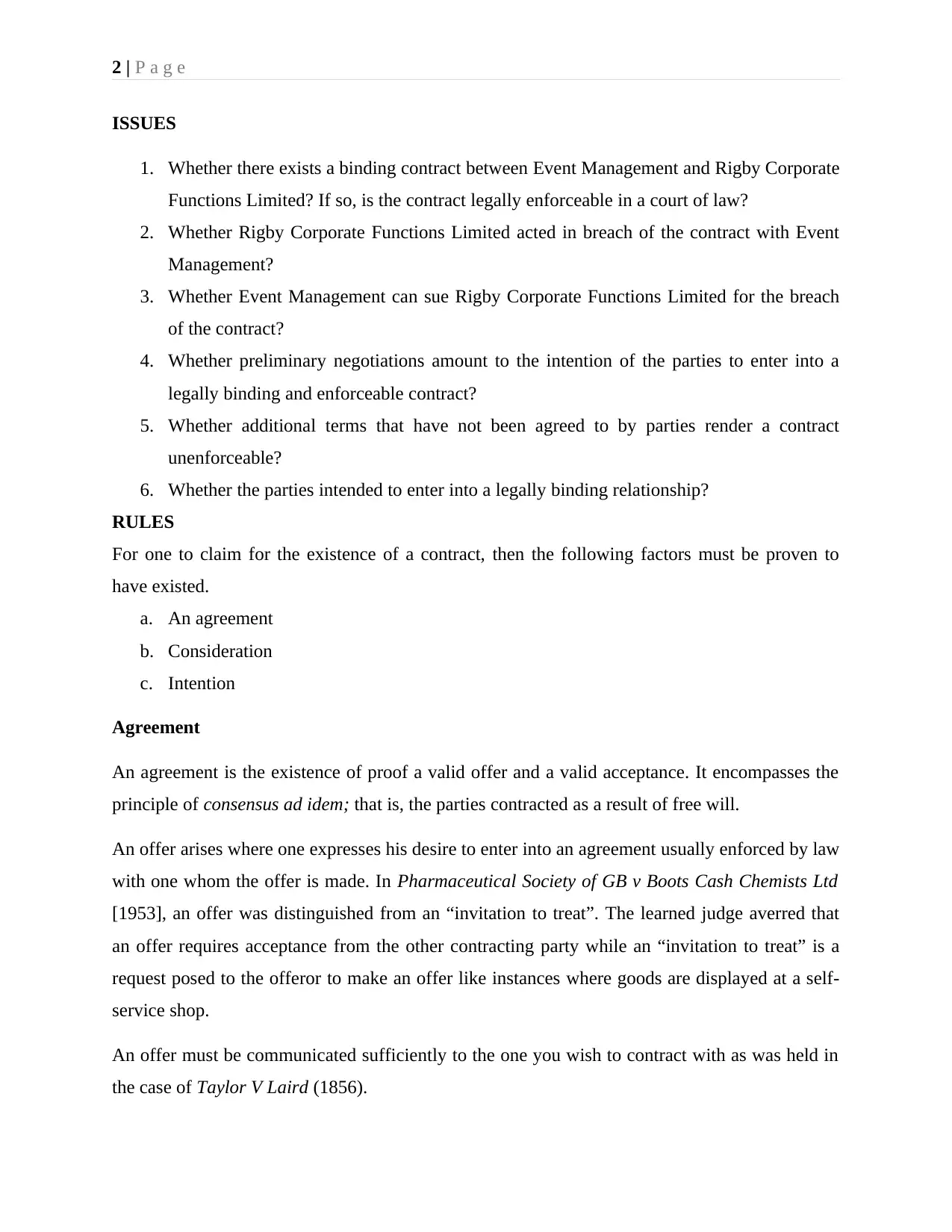
2 | P a g e
ISSUES
1. Whether there exists a binding contract between Event Management and Rigby Corporate
Functions Limited? If so, is the contract legally enforceable in a court of law?
2. Whether Rigby Corporate Functions Limited acted in breach of the contract with Event
Management?
3. Whether Event Management can sue Rigby Corporate Functions Limited for the breach
of the contract?
4. Whether preliminary negotiations amount to the intention of the parties to enter into a
legally binding and enforceable contract?
5. Whether additional terms that have not been agreed to by parties render a contract
unenforceable?
6. Whether the parties intended to enter into a legally binding relationship?
RULES
For one to claim for the existence of a contract, then the following factors must be proven to
have existed.
a. An agreement
b. Consideration
c. Intention
Agreement
An agreement is the existence of proof a valid offer and a valid acceptance. It encompasses the
principle of consensus ad idem; that is, the parties contracted as a result of free will.
An offer arises where one expresses his desire to enter into an agreement usually enforced by law
with one whom the offer is made. In Pharmaceutical Society of GB v Boots Cash Chemists Ltd
[1953], an offer was distinguished from an “invitation to treat”. The learned judge averred that
an offer requires acceptance from the other contracting party while an “invitation to treat” is a
request posed to the offeror to make an offer like instances where goods are displayed at a self-
service shop.
An offer must be communicated sufficiently to the one you wish to contract with as was held in
the case of Taylor V Laird (1856).
ISSUES
1. Whether there exists a binding contract between Event Management and Rigby Corporate
Functions Limited? If so, is the contract legally enforceable in a court of law?
2. Whether Rigby Corporate Functions Limited acted in breach of the contract with Event
Management?
3. Whether Event Management can sue Rigby Corporate Functions Limited for the breach
of the contract?
4. Whether preliminary negotiations amount to the intention of the parties to enter into a
legally binding and enforceable contract?
5. Whether additional terms that have not been agreed to by parties render a contract
unenforceable?
6. Whether the parties intended to enter into a legally binding relationship?
RULES
For one to claim for the existence of a contract, then the following factors must be proven to
have existed.
a. An agreement
b. Consideration
c. Intention
Agreement
An agreement is the existence of proof a valid offer and a valid acceptance. It encompasses the
principle of consensus ad idem; that is, the parties contracted as a result of free will.
An offer arises where one expresses his desire to enter into an agreement usually enforced by law
with one whom the offer is made. In Pharmaceutical Society of GB v Boots Cash Chemists Ltd
[1953], an offer was distinguished from an “invitation to treat”. The learned judge averred that
an offer requires acceptance from the other contracting party while an “invitation to treat” is a
request posed to the offeror to make an offer like instances where goods are displayed at a self-
service shop.
An offer must be communicated sufficiently to the one you wish to contract with as was held in
the case of Taylor V Laird (1856).

3 | P a g e
Any offer must first be accepted for there to be a legally binding contract. In R v Clarke (1927),
it was held that for an acceptance to be deemed to have taken place, the parties must satisfy the
fact that there was knowledge of the offer and the intention of the acceptance of the offer.
Besides, in Hyde v Wrench (1840, a rule on acceptance was founded terming acceptance as
unconditional.
According to Yates V Pulleyn (1975), acceptance shall presume no style unless directed.
Consideration
According to “Australian Woollen Mills Pty Ltd v The Commonwealth” (1954), a contract can
only be enforceable is there is a consideration. In Bunn V Guy (1803), the learned judge
described consideration as "loss or inconvenience suffered by one party at the request of the
other.”
Consideration may take many forms from monetary to the promise that one will undertake a
particular act (Executory consideration). Under Australian law, consideration is not about
adequacy but sufficiency (real, tangible, of actual value) for it is not the role of the judge to
evaluate the costs. This was the rationale in Woolswoth Ltd v Kelly (1991).
Intention
The parties must exude the desire to form a legally binding relationship as a general rule
commercial dealings are presumed to be legally binding relationships. This is owed to the fact
that businesses generally are a creation of the law like the Company's Act; thus, its activities are
legally bound. This was the rationale in the matter between Helmos Enterprises Pty Ltd v Jaylor
Pty Ltd (2005).
The Masters v Cameron case of 1954, outlined guiding principles when a court is faced with
determining whether there was the “intention to create a legally binding” relationship owing to
preliminary negotiations. These include;
The parties will be bound to the bargain if a duly executed contract will not alter the effect on the
terms agreed to during the agreement.
The parties should be bound to the initial agreement if their performance was suspended until the
formalization of the transaction into a contract.
Any offer must first be accepted for there to be a legally binding contract. In R v Clarke (1927),
it was held that for an acceptance to be deemed to have taken place, the parties must satisfy the
fact that there was knowledge of the offer and the intention of the acceptance of the offer.
Besides, in Hyde v Wrench (1840, a rule on acceptance was founded terming acceptance as
unconditional.
According to Yates V Pulleyn (1975), acceptance shall presume no style unless directed.
Consideration
According to “Australian Woollen Mills Pty Ltd v The Commonwealth” (1954), a contract can
only be enforceable is there is a consideration. In Bunn V Guy (1803), the learned judge
described consideration as "loss or inconvenience suffered by one party at the request of the
other.”
Consideration may take many forms from monetary to the promise that one will undertake a
particular act (Executory consideration). Under Australian law, consideration is not about
adequacy but sufficiency (real, tangible, of actual value) for it is not the role of the judge to
evaluate the costs. This was the rationale in Woolswoth Ltd v Kelly (1991).
Intention
The parties must exude the desire to form a legally binding relationship as a general rule
commercial dealings are presumed to be legally binding relationships. This is owed to the fact
that businesses generally are a creation of the law like the Company's Act; thus, its activities are
legally bound. This was the rationale in the matter between Helmos Enterprises Pty Ltd v Jaylor
Pty Ltd (2005).
The Masters v Cameron case of 1954, outlined guiding principles when a court is faced with
determining whether there was the “intention to create a legally binding” relationship owing to
preliminary negotiations. These include;
The parties will be bound to the bargain if a duly executed contract will not alter the effect on the
terms agreed to during the agreement.
The parties should be bound to the initial agreement if their performance was suspended until the
formalization of the transaction into a contract.
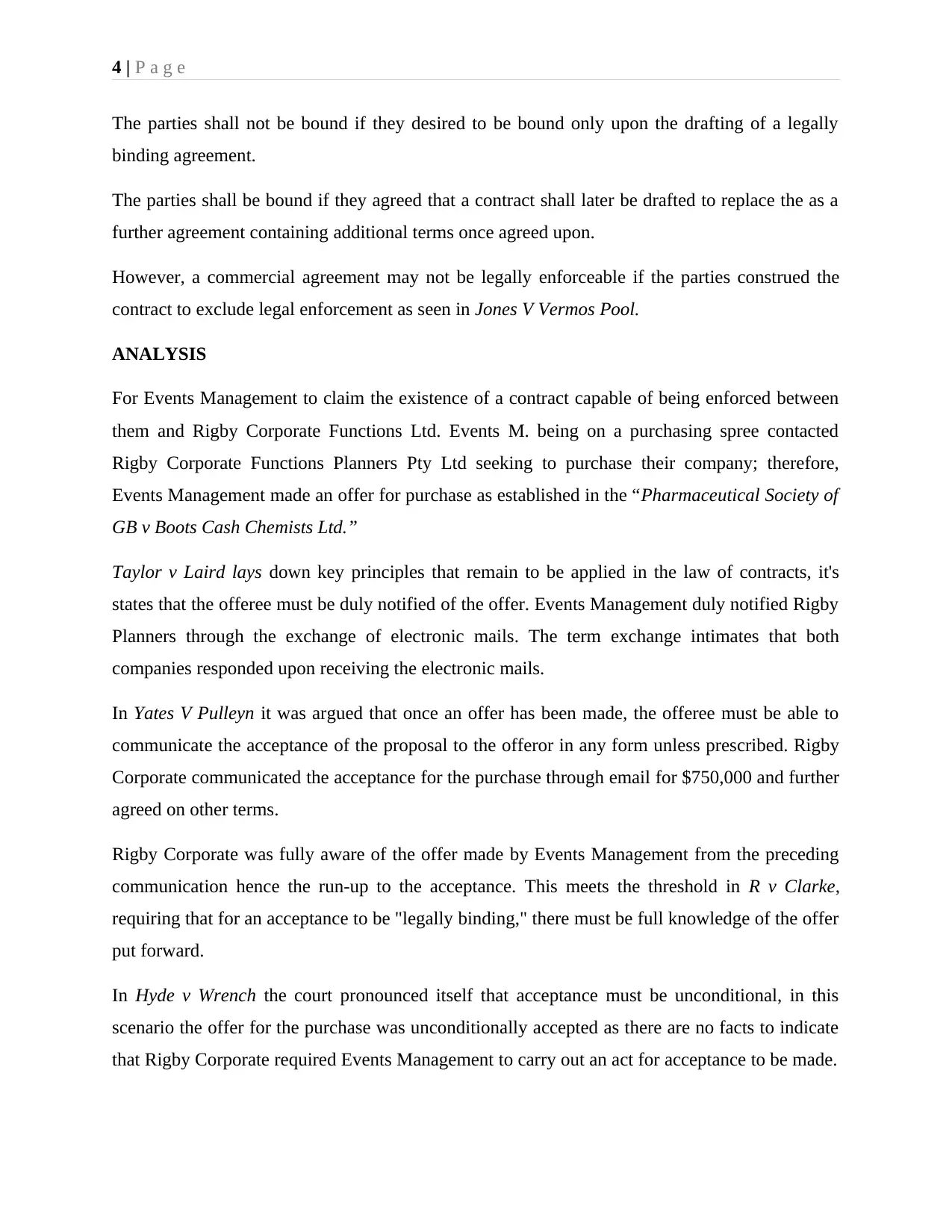
4 | P a g e
The parties shall not be bound if they desired to be bound only upon the drafting of a legally
binding agreement.
The parties shall be bound if they agreed that a contract shall later be drafted to replace the as a
further agreement containing additional terms once agreed upon.
However, a commercial agreement may not be legally enforceable if the parties construed the
contract to exclude legal enforcement as seen in Jones V Vermos Pool.
ANALYSIS
For Events Management to claim the existence of a contract capable of being enforced between
them and Rigby Corporate Functions Ltd. Events M. being on a purchasing spree contacted
Rigby Corporate Functions Planners Pty Ltd seeking to purchase their company; therefore,
Events Management made an offer for purchase as established in the “Pharmaceutical Society of
GB v Boots Cash Chemists Ltd.”
Taylor v Laird lays down key principles that remain to be applied in the law of contracts, it's
states that the offeree must be duly notified of the offer. Events Management duly notified Rigby
Planners through the exchange of electronic mails. The term exchange intimates that both
companies responded upon receiving the electronic mails.
In Yates V Pulleyn it was argued that once an offer has been made, the offeree must be able to
communicate the acceptance of the proposal to the offeror in any form unless prescribed. Rigby
Corporate communicated the acceptance for the purchase through email for $750,000 and further
agreed on other terms.
Rigby Corporate was fully aware of the offer made by Events Management from the preceding
communication hence the run-up to the acceptance. This meets the threshold in R v Clarke,
requiring that for an acceptance to be "legally binding," there must be full knowledge of the offer
put forward.
In Hyde v Wrench the court pronounced itself that acceptance must be unconditional, in this
scenario the offer for the purchase was unconditionally accepted as there are no facts to indicate
that Rigby Corporate required Events Management to carry out an act for acceptance to be made.
The parties shall not be bound if they desired to be bound only upon the drafting of a legally
binding agreement.
The parties shall be bound if they agreed that a contract shall later be drafted to replace the as a
further agreement containing additional terms once agreed upon.
However, a commercial agreement may not be legally enforceable if the parties construed the
contract to exclude legal enforcement as seen in Jones V Vermos Pool.
ANALYSIS
For Events Management to claim the existence of a contract capable of being enforced between
them and Rigby Corporate Functions Ltd. Events M. being on a purchasing spree contacted
Rigby Corporate Functions Planners Pty Ltd seeking to purchase their company; therefore,
Events Management made an offer for purchase as established in the “Pharmaceutical Society of
GB v Boots Cash Chemists Ltd.”
Taylor v Laird lays down key principles that remain to be applied in the law of contracts, it's
states that the offeree must be duly notified of the offer. Events Management duly notified Rigby
Planners through the exchange of electronic mails. The term exchange intimates that both
companies responded upon receiving the electronic mails.
In Yates V Pulleyn it was argued that once an offer has been made, the offeree must be able to
communicate the acceptance of the proposal to the offeror in any form unless prescribed. Rigby
Corporate communicated the acceptance for the purchase through email for $750,000 and further
agreed on other terms.
Rigby Corporate was fully aware of the offer made by Events Management from the preceding
communication hence the run-up to the acceptance. This meets the threshold in R v Clarke,
requiring that for an acceptance to be "legally binding," there must be full knowledge of the offer
put forward.
In Hyde v Wrench the court pronounced itself that acceptance must be unconditional, in this
scenario the offer for the purchase was unconditionally accepted as there are no facts to indicate
that Rigby Corporate required Events Management to carry out an act for acceptance to be made.
Secure Best Marks with AI Grader
Need help grading? Try our AI Grader for instant feedback on your assignments.
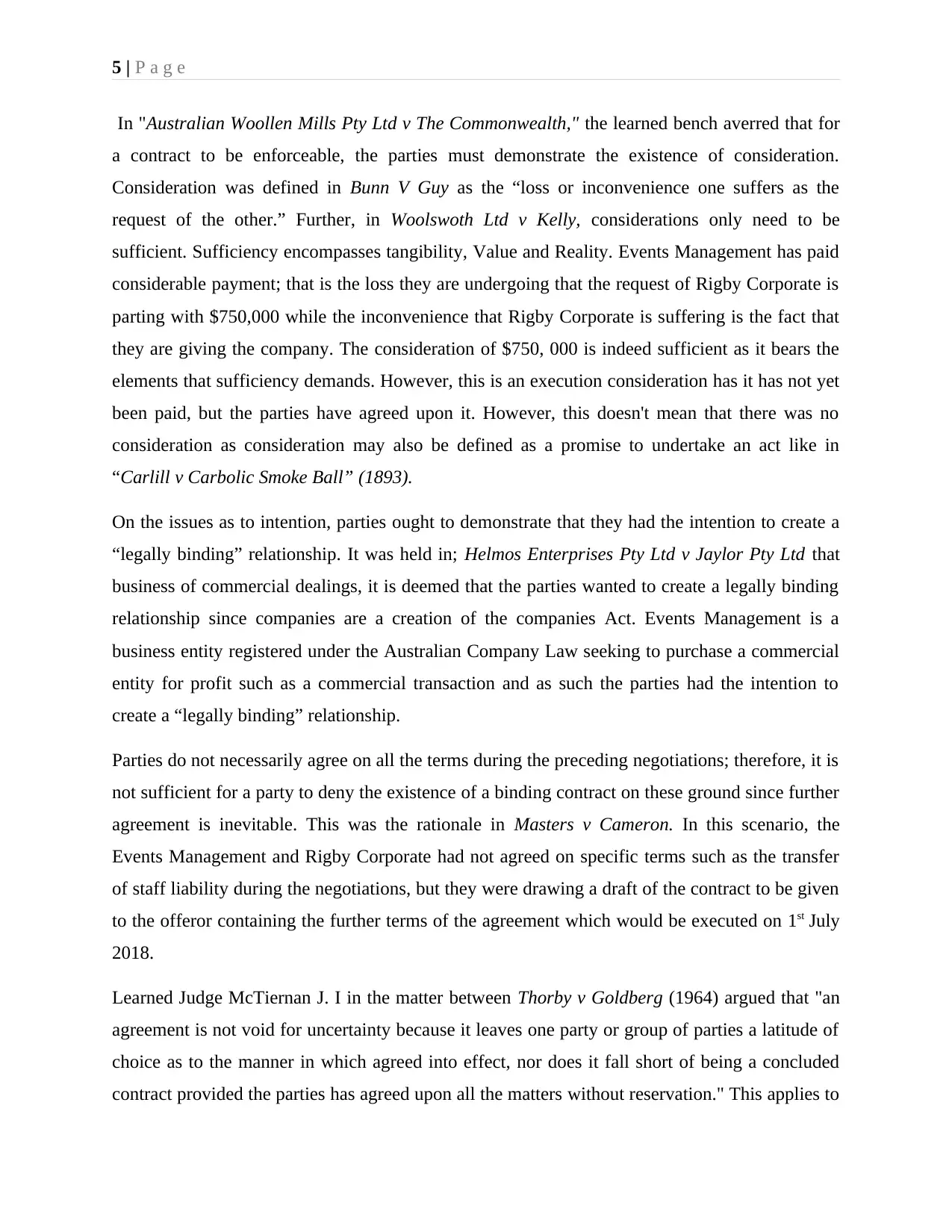
5 | P a g e
In "Australian Woollen Mills Pty Ltd v The Commonwealth," the learned bench averred that for
a contract to be enforceable, the parties must demonstrate the existence of consideration.
Consideration was defined in Bunn V Guy as the “loss or inconvenience one suffers as the
request of the other.” Further, in Woolswoth Ltd v Kelly, considerations only need to be
sufficient. Sufficiency encompasses tangibility, Value and Reality. Events Management has paid
considerable payment; that is the loss they are undergoing that the request of Rigby Corporate is
parting with $750,000 while the inconvenience that Rigby Corporate is suffering is the fact that
they are giving the company. The consideration of $750, 000 is indeed sufficient as it bears the
elements that sufficiency demands. However, this is an execution consideration has it has not yet
been paid, but the parties have agreed upon it. However, this doesn't mean that there was no
consideration as consideration may also be defined as a promise to undertake an act like in
“Carlill v Carbolic Smoke Ball” (1893).
On the issues as to intention, parties ought to demonstrate that they had the intention to create a
“legally binding” relationship. It was held in; Helmos Enterprises Pty Ltd v Jaylor Pty Ltd that
business of commercial dealings, it is deemed that the parties wanted to create a legally binding
relationship since companies are a creation of the companies Act. Events Management is a
business entity registered under the Australian Company Law seeking to purchase a commercial
entity for profit such as a commercial transaction and as such the parties had the intention to
create a “legally binding” relationship.
Parties do not necessarily agree on all the terms during the preceding negotiations; therefore, it is
not sufficient for a party to deny the existence of a binding contract on these ground since further
agreement is inevitable. This was the rationale in Masters v Cameron. In this scenario, the
Events Management and Rigby Corporate had not agreed on specific terms such as the transfer
of staff liability during the negotiations, but they were drawing a draft of the contract to be given
to the offeror containing the further terms of the agreement which would be executed on 1st July
2018.
Learned Judge McTiernan J. I in the matter between Thorby v Goldberg (1964) argued that "an
agreement is not void for uncertainty because it leaves one party or group of parties a latitude of
choice as to the manner in which agreed into effect, nor does it fall short of being a concluded
contract provided the parties has agreed upon all the matters without reservation." This applies to
In "Australian Woollen Mills Pty Ltd v The Commonwealth," the learned bench averred that for
a contract to be enforceable, the parties must demonstrate the existence of consideration.
Consideration was defined in Bunn V Guy as the “loss or inconvenience one suffers as the
request of the other.” Further, in Woolswoth Ltd v Kelly, considerations only need to be
sufficient. Sufficiency encompasses tangibility, Value and Reality. Events Management has paid
considerable payment; that is the loss they are undergoing that the request of Rigby Corporate is
parting with $750,000 while the inconvenience that Rigby Corporate is suffering is the fact that
they are giving the company. The consideration of $750, 000 is indeed sufficient as it bears the
elements that sufficiency demands. However, this is an execution consideration has it has not yet
been paid, but the parties have agreed upon it. However, this doesn't mean that there was no
consideration as consideration may also be defined as a promise to undertake an act like in
“Carlill v Carbolic Smoke Ball” (1893).
On the issues as to intention, parties ought to demonstrate that they had the intention to create a
“legally binding” relationship. It was held in; Helmos Enterprises Pty Ltd v Jaylor Pty Ltd that
business of commercial dealings, it is deemed that the parties wanted to create a legally binding
relationship since companies are a creation of the companies Act. Events Management is a
business entity registered under the Australian Company Law seeking to purchase a commercial
entity for profit such as a commercial transaction and as such the parties had the intention to
create a “legally binding” relationship.
Parties do not necessarily agree on all the terms during the preceding negotiations; therefore, it is
not sufficient for a party to deny the existence of a binding contract on these ground since further
agreement is inevitable. This was the rationale in Masters v Cameron. In this scenario, the
Events Management and Rigby Corporate had not agreed on specific terms such as the transfer
of staff liability during the negotiations, but they were drawing a draft of the contract to be given
to the offeror containing the further terms of the agreement which would be executed on 1st July
2018.
Learned Judge McTiernan J. I in the matter between Thorby v Goldberg (1964) argued that "an
agreement is not void for uncertainty because it leaves one party or group of parties a latitude of
choice as to the manner in which agreed into effect, nor does it fall short of being a concluded
contract provided the parties has agreed upon all the matters without reservation." This applies to
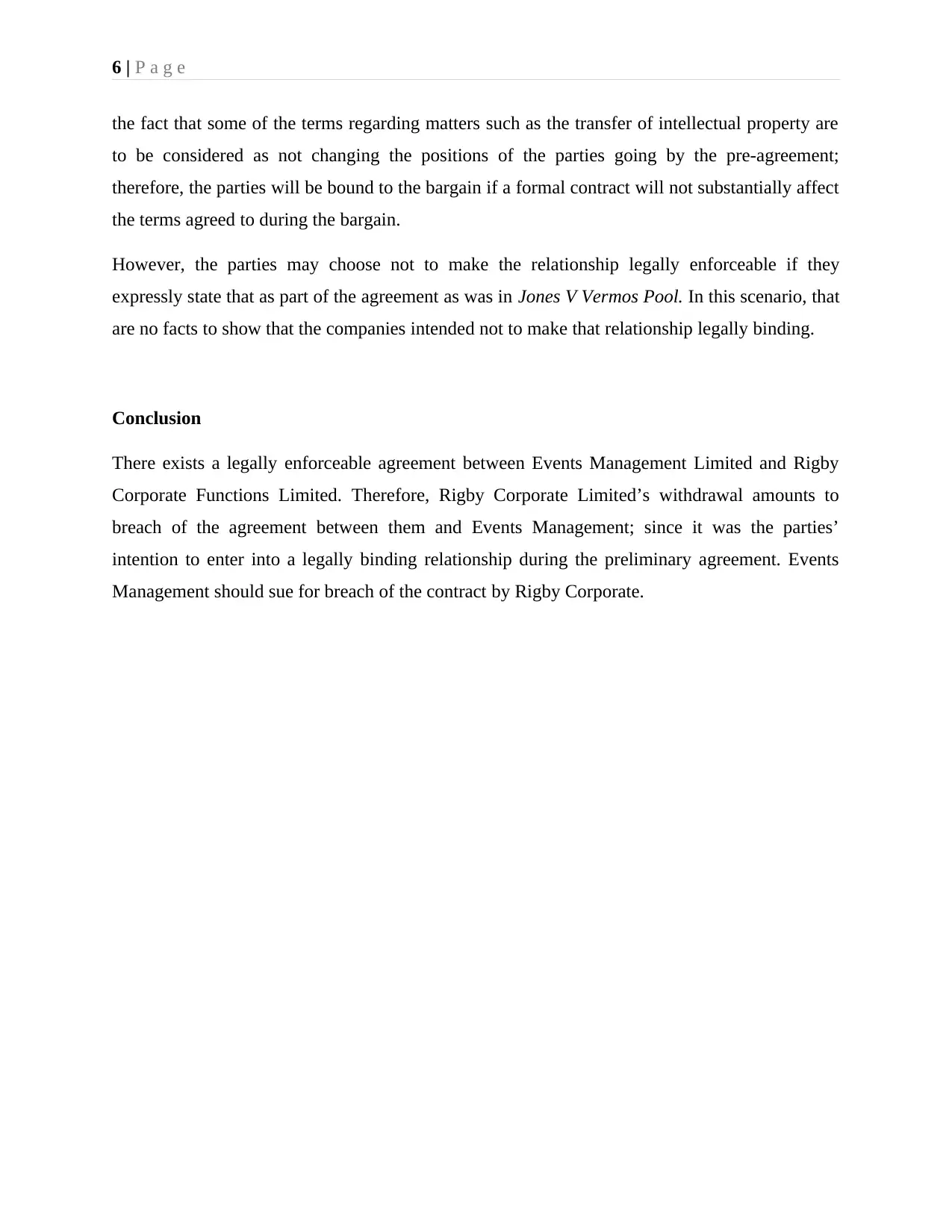
6 | P a g e
the fact that some of the terms regarding matters such as the transfer of intellectual property are
to be considered as not changing the positions of the parties going by the pre-agreement;
therefore, the parties will be bound to the bargain if a formal contract will not substantially affect
the terms agreed to during the bargain.
However, the parties may choose not to make the relationship legally enforceable if they
expressly state that as part of the agreement as was in Jones V Vermos Pool. In this scenario, that
are no facts to show that the companies intended not to make that relationship legally binding.
Conclusion
There exists a legally enforceable agreement between Events Management Limited and Rigby
Corporate Functions Limited. Therefore, Rigby Corporate Limited’s withdrawal amounts to
breach of the agreement between them and Events Management; since it was the parties’
intention to enter into a legally binding relationship during the preliminary agreement. Events
Management should sue for breach of the contract by Rigby Corporate.
the fact that some of the terms regarding matters such as the transfer of intellectual property are
to be considered as not changing the positions of the parties going by the pre-agreement;
therefore, the parties will be bound to the bargain if a formal contract will not substantially affect
the terms agreed to during the bargain.
However, the parties may choose not to make the relationship legally enforceable if they
expressly state that as part of the agreement as was in Jones V Vermos Pool. In this scenario, that
are no facts to show that the companies intended not to make that relationship legally binding.
Conclusion
There exists a legally enforceable agreement between Events Management Limited and Rigby
Corporate Functions Limited. Therefore, Rigby Corporate Limited’s withdrawal amounts to
breach of the agreement between them and Events Management; since it was the parties’
intention to enter into a legally binding relationship during the preliminary agreement. Events
Management should sue for breach of the contract by Rigby Corporate.
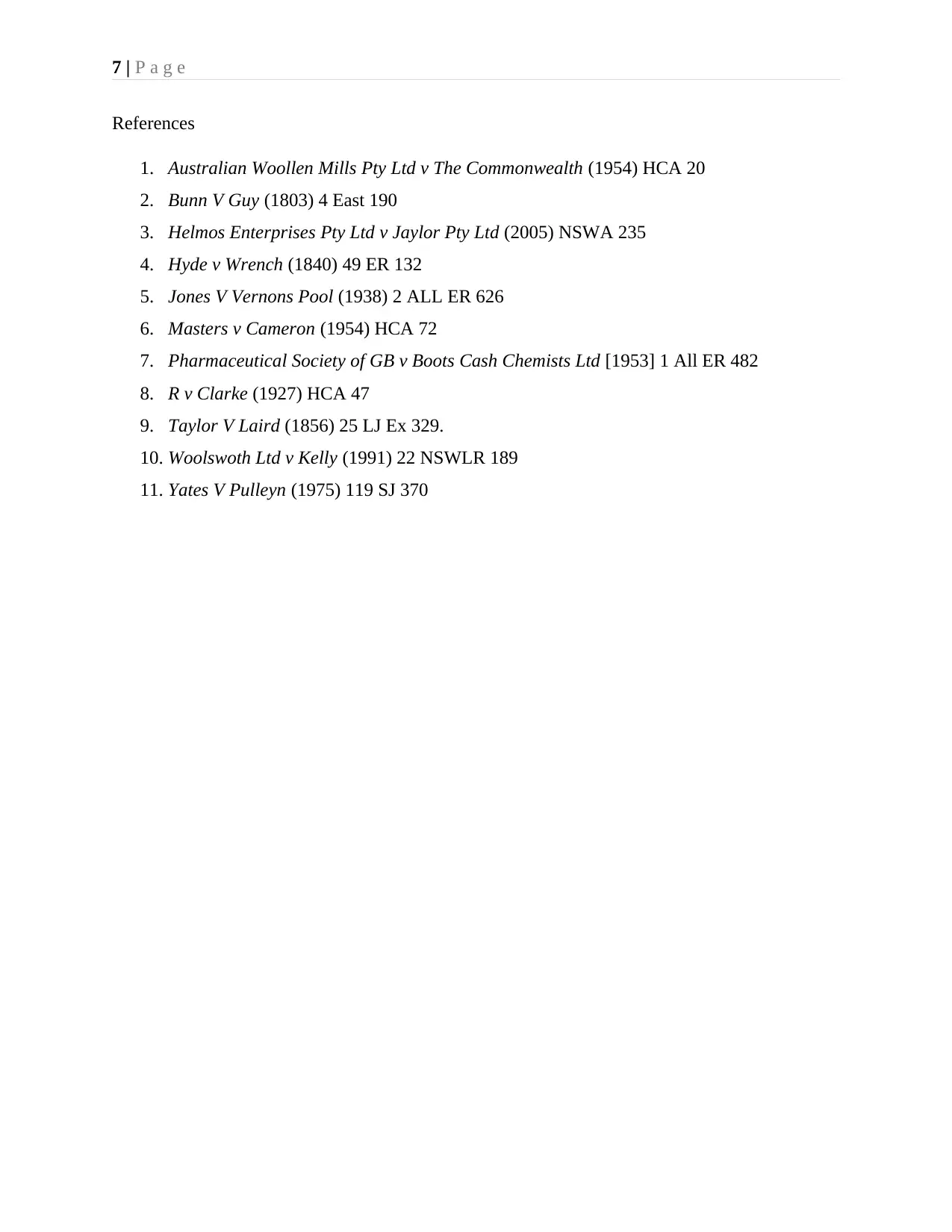
7 | P a g e
References
1. Australian Woollen Mills Pty Ltd v The Commonwealth (1954) HCA 20
2. Bunn V Guy (1803) 4 East 190
3. Helmos Enterprises Pty Ltd v Jaylor Pty Ltd (2005) NSWA 235
4. Hyde v Wrench (1840) 49 ER 132
5. Jones V Vernons Pool (1938) 2 ALL ER 626
6. Masters v Cameron (1954) HCA 72
7. Pharmaceutical Society of GB v Boots Cash Chemists Ltd [1953] 1 All ER 482
8. R v Clarke (1927) HCA 47
9. Taylor V Laird (1856) 25 LJ Ex 329.
10. Woolswoth Ltd v Kelly (1991) 22 NSWLR 189
11. Yates V Pulleyn (1975) 119 SJ 370
References
1. Australian Woollen Mills Pty Ltd v The Commonwealth (1954) HCA 20
2. Bunn V Guy (1803) 4 East 190
3. Helmos Enterprises Pty Ltd v Jaylor Pty Ltd (2005) NSWA 235
4. Hyde v Wrench (1840) 49 ER 132
5. Jones V Vernons Pool (1938) 2 ALL ER 626
6. Masters v Cameron (1954) HCA 72
7. Pharmaceutical Society of GB v Boots Cash Chemists Ltd [1953] 1 All ER 482
8. R v Clarke (1927) HCA 47
9. Taylor V Laird (1856) 25 LJ Ex 329.
10. Woolswoth Ltd v Kelly (1991) 22 NSWLR 189
11. Yates V Pulleyn (1975) 119 SJ 370
1 out of 7
Related Documents
Your All-in-One AI-Powered Toolkit for Academic Success.
+13062052269
info@desklib.com
Available 24*7 on WhatsApp / Email
![[object Object]](/_next/static/media/star-bottom.7253800d.svg)
Unlock your academic potential
© 2024 | Zucol Services PVT LTD | All rights reserved.




